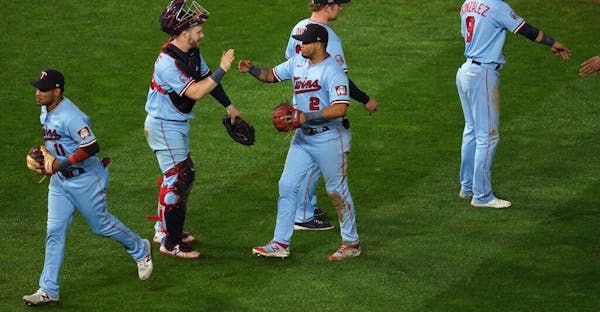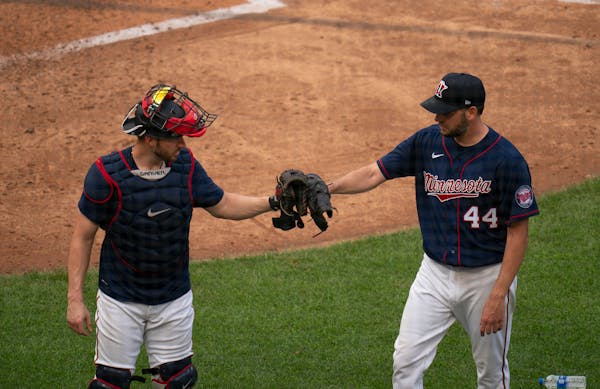Training camp has barely started and it feels almost over. Opening Day is only 16 days away, creating a desperate race to strengthen pitching arms enough for major league competition.
Has Twins pitching coach Wes Johnson ever faced such a crazy, challenging time crunch?
Pfft. Only every year.
"That's a typical college season. You get back from Christmas, your guys have taken five or six weeks off [because of] finals, and you literally have three weeks before you play a game. And you're expected to start winning immediately," said Johnson, whose pre-Twins career included nine seasons of college coaching, the last one with College World Series runner-up Arkansas. "I'm excited. It's almost like in my wheelhouse a little bit."
Even more exciting is the depth of experienced pitchers the Twins take into 2020, Johnson said, and especially the physical condition those arms are in.
"They're all ready. I really don't have one guy who came in and told me where he was [physically], and he wasn't there. And that's big," Johnson said after a week of inspecting a pitching staff that hadn't undergone an organized workout in 16 weeks. "That's very, very encouraging and exciting."
So is the math. Despite the abbreviated camp and dense schedule, which starts with 39 games in the first 41 days, Johnson intends to maintain a normal five-man rotation as much as possible, he said on a video news conference Tuesday. In addition, "I would like to see two really good length options for us in our bullpen, in case we need to [change pitchers] early with some guys," Johnson said, and both of those will be starting pitchers temporarily conscripted into the bullpen.
In some recent Twins camps, finding seven dependable starting pitchers would be inconceivable. This year, after some offseason additions, it's elementary, Johnson figures.
Jose Berrios, Jake Odorizzi, Kenta Maeda, Rich Hill and Homer Bailey — a quintet with more than 30 MLB seasons among them, and each of whom has been entrusted with at least one postseason start — figure to be the front-runners for the starting roles, but Devin Smeltzer and Randy Dobnak showed the ability last year to break into that group. Jhoulys Chacin is another big-league veteran with an impressive résumé, and Lewis Thorpe and Sean Poppen have shown enough in the minor leagues to deserve consideration.
That's 10 pitchers to choose from, and the list will grow to 11 when Michael Pineda becomes eligible again in September. Gentlemen, start your engines.
"If everybody's healthy, we'll start our best five," Johnson said of a crowded field of competitors. "If guys continue to progress, we should be fine."
The short schedule, though, definitely increases the intensity, the pressure to be ready from the start. Hill, the 40-year-old lefthander throwing hard only eight months after elbow surgery, sounds excited to experience a pennant drag race.
"It's like nothing we've seen, so every game, you have to have that playoff mentality and that playoff drive to win every single day, because if you fall behind early by five games, that could be it," Hill said. "I mean, honestly I think we're going to see someone go 50-10 and you don't want to put yourself in that position where you're going to end up five games back and you're just clawing back the entire way."
That sort of intensity, Johnson said, is another reason why he's excited about suddenly owning one of the more experienced starting staffs in the league. He can see it even when the veterans are simply warming up.
"It's not so much about the effort, because it's not like they're going 100 percent in the bullpen. But it's just the intensity and the focus that they [exhibit]. They're locked into their breathing. They're going through their pre-pitch routine, every pitch," Johnson said. "It's not that the young guys don't want to do that, but it gets away from them sometimes. It speeds up on them a little bit."
That focus could pay off once the season gets underway, Hill agreed.
"You have Odorizzi, who comes in and other pitchers are watching him, and watching his leadership. There's not too many guys who aren't hungry to play the game and go out there and win," Hill said. "Everybody here has the ability, everybody here has the talent. So what is the separator at the end of the day? Just a certain intensity that you need to have to go out there and win."
Carlos Carrasco pitches solid into the 6th inning, Guardians edge Red Sox 5-4 to improve to 13-6

Live: Wild wrap regular season vs. Seattle, follow on Gameview
Kansas adds AJ Storr after he led Wisconsin in scoring this past season


